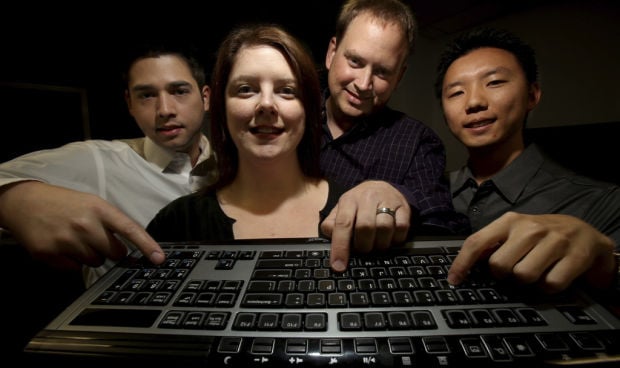With cyberspying in the news daily, several students at the University of Arizona are already committed to working as experts for U.S. agencies such as the FBI, the CIA and the National Security Agency.
“We are training the next generation of cybersecurity professionals,” says UA Regents’ Professor Hsinchun Chen.
The students are working in the research center AZSecure Center for Cyber Analytics, where they are looking at IP addresses and the vulnerabilities of various devices.
Manufacturers create unique IP addresses that hackers can tap into, Chen said.
For example, hackers from China may have the ability to control cameras within a home watching a child sleep and take photos.
Hackers may also have the ability to control traffic lights or even an individual’s pacemaker.
Chen, a professor in management information systems, received two National Science Foundation grants of $5.4 million for two cybersecurity projects, one in research and the other in education.
He also received an AZSecure grant of $4.2 million for five years that will help pay for a student fellowship program called Scholarship for Service.
“This is very forward-looking and is a very unique program that is leading cybersecurity research of education in the world, not just the U.S.,” Chen said.
He received funding for both programs on Sept. 1, and in three weeks selected four MIS master’s students from a pool of about 30 for the fellowship program.
The students are Eric Gross, Ryan Chinn, Leon Walker and Samantha Forbis.
Under the AZSecure grant, these students will have their two years of graduate school paid for and in return will serve in the government as cybersecurity or information-security professionals for two more years.
These government agencies may include the CIA, FBI or NSA.
Walker and Chinn are looking into working at the NSA; Forbis can see herself working with the NSF, or National Geospatial Intelligence Agency; and Gross said he would most likely end up in Washington, D.C.
“I’ll just have to see,” Gross said. “Hopefully, (I’ll gain) expertise in mobile hacking, to be one of the few experts in the field, which is pretty cool.”
Each scholarship is valued at $100,000 for two years. Students will also receive a stipend valued at $1,000 for two years and will work as research assistants for 20 hours a week.
“We do a lot of analysis, so that is the unique aspect of our program versus any program in the country right now,” Chen said. “We train our students and our researchers to conduct different data, techs and web mining research, such that we can understand what is going on and what is going to come in the near or distant future.”
The program has a combination of master’s database and system analysis courses, but also a set of customized courses that are under an NSA program called Information Security and Assurance.
Students are trained through NSA security courses as part of the two-year curriculum. The first year includes an independent study with faculty members and a master’s thesis. After the first year, students will intern with government agencies for three months.
Toward the end of two years, students will attend a job fair with potential government employers.
“You’re almost guaranteed with a placement, that you have a career in the future for another foreseeable five or 10 years and that you can be the leaders in cybersecurity research and cybersecurity practice in the industries,” Chen said. “It’s a very exciting program.”
After serving in the government, graduates can decide to move to a private industry for a career or stay where they are.
“I’ll most likely go to a private industry. … It’s less stressful,” Forbis said.
This year, Chen was able to reach out only to his department’s master’s students; however, he plans to reach a larger group next year, since more scholarships will be available.
Chen wants to encourage students from other departments to apply, including undergraduate juniors and seniors, master’s students and doctoral students. He also wants to reach out to military bases, community colleges and tribal colleges.
There will be a new cohort of students every year for the next five years.
This February- March, prospective students can apply and interview to be part of the next 10-person cohort in August.
According to Chen, past programs have had a 95 percent success rate, which means students finished the degree program, interned and were placed in a government agency for the next two years.
The program will fund a total of 40 students.
Chen also received a research grant of $1.2 million for three years to fund his Hacker Web project, a research project for faculty members and graduate students.
“So, basically, we are trying to explore and understand the hacker community, how they interact and what are the emerging threats,” Chen said.
Researchers will collect and analyze data that will help them anticipate future incidents or threats, whereas other research focuses on being defensive and protecting parameters.
“In a police murder investigation … you don’t just look at the bullets, you trace the gun and find the person who shot the bullets,” Chen said. “It’s the person who is important, not the weapon; so our project is probably the only one that goes all the way to the source and tries to understand the hackers.”





